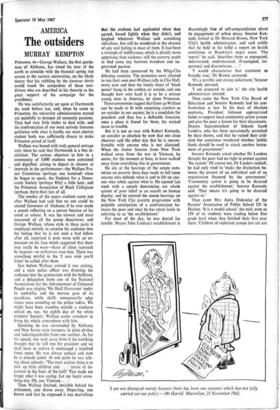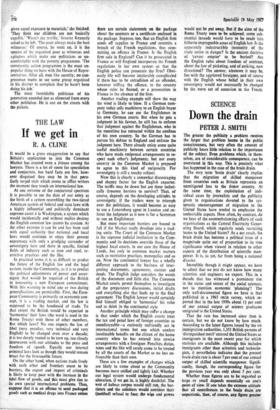The outsiders
AMERICA MURRAY KEMPTON
Princeton, NJ—George Wallace, the first gentle- man of Alabama, has timed his tour of the north to coincide with the biennial spring riot season at the eastern universities, on the likely theory that his rabbling by the jeunesse doree would touch the sympathies of those taxi- drivers who are described in his rhetoric as the great support of his campaign for the presidency.
He was satisfactorily set upon at Dartmouth the week before last, and, when he came to Princeton, the university administration moved out painfully to dampen all unseemly passions. They had very little tinder to deal with; and the confrontation of our most actively tiresome politician with what is hardly our most electric student body was sufficiently dreary to make Princeton proud of itself.
Wallace was booed with truly general outrage only when he said that Dartmouth is a fine in- stitution. The serious objectors to him in a community of 3,600 students were contained and dignified, arising to depart in clusters at intervals in the performance—the Wallace Pro- test Committee (perhaps one hundred) when he began to speak, the Students for a Demo- cratic Society (perhaps fifty) a little later, and the Princeton Association of Black Collegians (perhaps thirty-five) last of all.
The exodus of the negro students came just after Wallace had said that no one could be elected Governor of Alabama if he ever made a speech reflecting on a person because of his creed or colour. It was the slowest and most measured of all the group departures; and George Wallace, whose style in these parts is employed entirely to surprise his audience into the feeling that he is not such a bad fellow after all, surprised it even more with an ex- pression on his face which suggested that there may really be ways—those of silent reproach by negroes—to embarrass even him. There was something wistful in the 'I sure wish you'd listen' he called after them.
Just before Wallace arrived it was raining, and a state police officer was directing the audience into the gymnasium with his bullhorn, and a delegation from one of the National Associations for the Advancement of Coloured People was singing 'We Shall Overcome' under its umbrellas and the morose gaze of its guardians, while shrill, unnecessarily edgy voices were sounding on the police radios. We might have been standing outside a southern school on, say, the eighth day of the white students' boycott; Wallace seems somehow to bring his whole atmosphere with him.
Speaking, he was surrounded by Alabama and New Jersey state troopers, in plain clothes and indistinguishable from one another. As for his speech, one took away from it the numbing thought that he will run for president and we shall have to endure it unchanged a hundred times more. He was always cynical and now he is already jaded. At one point he was talk- ing about schools: 'The most asinine thing is to pick up little children and . . .' (noise of de- parture in the back of the hall) 'You made me forget what I was saying. Let me begin some- thing else. Oh, yes, Vietnam. ...'
Then Wallace finished, invisible behind his policemen, and drove away. Departing, one hearer said that he supposed it was marvellous
that the students had applauded when they agreed, booed lightly when they didn't, and laughed whenever Wallace said something ridiculous; but still he wondered at the absence of any real feeling in most of them. It had been a triumph of indifference, which is plainly more appetising than violence; still the country ought to find some key between boredom and un- governed passion.
He had been sponsored by the Whig-Clio debating societies. The protesters were allowed to run their own post-Wallace rally in Clio Hall; every now and then the lonely shout of 'black power' hung in the sodden air outside, and one thought how very hard it is to be a serious young man in America, let alone Princeton.
These ceremonies suggest that Geon ge Wallace can be made to fit with surprising comfort as an outsider in our society; he is a candidate for president and thus has a definable function; once a place is found for them, the wicked cease to trouble.
But it is not so easy with Robert Kennedy, an outsider so absolute by now that one close observer said the other day that he is uncom- fortable with anyone who is not alienated. When the Junior Senator from New York walked away from the war in Vietnam, he seems, for the moment at least, to have walked away from everything else in government.
He sits at the hearings of the senate com- mittee on poverty these days ready to fall upon anyone who defends what is and to lift up any- one who rebels against what is. He opened last week with a speech denouncing our whole system of poor relief as an assault on human dignity; and he entered the senate hearings on the New York City poverty programme with palpable anticipation of a confrontation be- tween the poor and what he has taken lately to referring to as 'the establishment.'
For most of the day, he was denied his rumble. Mayor John Lindsay's establishment is disarmingly free of self-congratulation about its engagement of urban decay. Senator Ken- nedy looked at Dr Howard Brown, New York City's health administrator, and said coldly that he held in his halicl a report on health conditions in Brooklyn's negro areas. 'The report,' he said, 'describes them as segregated, deteriorated, undermanned, ill-equipped, im- personal and discourteous.. ..'
'I would characterise that statement as broadly true.' Dr Brown answered.
'It's a terrible and strong indictment,' Senator Kennedy pursued.
'I am prepared to join it,' the city health administrator insisted.
Then came the New York City Board of Education and Senator Kennedy had his con- frontation at last. In his days of absolute euphoria, President Johnson appropriated funds to support local community action groups and give the poor a forum for their discontents. Deputy Superintendent of Schools Jacob Landers, who has been occasionally scratched by these thorns, said that he valued their criti- cism but sometimes wondered whether 'public funds should be used to attack another instru- ment of government.'
Senator Kennedy asked whether Dr Landers thought the poor had no right to protest against 'the system.' Of course not, Dr Landers replied; he had only tried to 'make the distinction be- tween the protest of an individual and of an organisation financed by the government.' 'Community action is going to be directed against the establishment,' Senator Kennedy said. 'That means it's going to be directed against us.'
Then came Mrs Anita Duboulay of the Parents' Association of Public School 125 in Harlem. 'It is a model school,' she said; even so 159 of its students were reading below first grade level when they finished their first year there. 'Children of exploited groups just are not given equal exposure to materials,' she finished. `They think our children are not basically capable.' Wasn't she terrific,' Senator Kennedy asked as he left. The poor always make the best witnesses.' Of course, he went on, it is the spectre of the organised poor as witnesses and agitators which make our politicians so un- comfortable with the poverty programme. 'The community action programme is the most un- popular thing we have with the House of Repre- sentatives. After all, men like security; no con- gressman wants to see some group organised in his district to complain that he hasn't been doing his job.'
The most formidable politician of his generation sounded just as alienated from every other politician. He is out on the streets with the pickets.



































 Previous page
Previous page